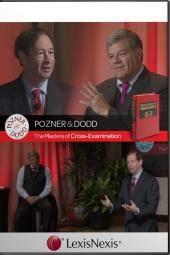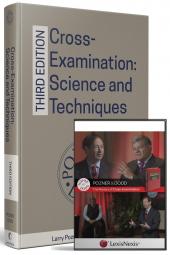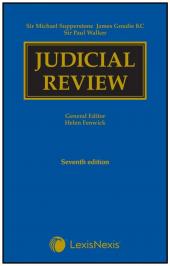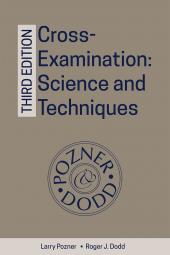Cross-Examination: Science and Techniques, 3rd Edition
One Year Subscription Only Terms
Subscribers receive the product(s) listed on the Order Form and any Updates made available during the annual subscription period. Shipping and handling fees are not included in the annual price.
Subscribers are advised of the number of Updates that were made to the particular publication the prior year. The number of Updates may vary due to developments in the law and other publishing issues, but subscribers may use this as a rough estimate of future shipments. Subscribers may call Customer Support at 800-833-9844 for additional information.
Subscribers may cancel this subscription by: calling Customer Support at 800-833-9844; emailing customer.support@lexisnexis.com; or returning the invoice marked 'CANCEL'.
If subscribers cancel within 30 days after the product is ordered or received and return the product at their expense, then they will receive a full credit of the price for the annual subscription.
If subscribers cancel between 31 and 60 days after the invoice date and return the product at their expense, then they will receive a 5/6th credit of the price for the annual subscription. No credit will be given for cancellations more than 60 days after the invoice date. To receive any credit, subscriber must return all product(s) shipped during the year at their expense within the applicable cancellation period listed above.
Product description
Cross-Examination: Science and Techniques, Third Edition is an extensive revision and reorganization of Pozner and Dodd's classic work, written to meet the needs of today's trial attorneys. Pozner and Dodd's signature techniques and methodologies, which have brought them acclaim as the nation's leading experts on cross-examination, are illustrated with numerous new examples added specifically for the Third Edition. The authors provide their best-ever coverage of the "chapter method" of cross-examination with additional excerpts to illustrate various trial scenarios. New content also includes Chapter 6 on Cross Preparation Systems: Sourcing the Facts, giving you the tools to immediately inform a witness, and the court, what electronic or paper document you are using and exactly where in the document is the material upon which you are questioning. As always, the authors, who have lectured on cross-examination to thousands of attorneys worldwide, guide you to successful trial outcomes with a conversational, engaging, and easy-to-read writing style.
Inside, you'll find valuable advice on how to:
- Use opponents' objections as the springboard for deeper and broader cross-examinations
- Sequence cross-examination to teach the theory of the case in the best way, and to literally expand the rules of admissibility
- Use "loops" (the practice of incorporating and repeating key phrases and terms in successive questions to the witness) to rename witnesses and exhibits
- Use "double loops" to discredit opposing expert witnesses
- Use voir dire to create great jurors
- Use a fact-driven investigation to develop a winning theory
- Use a witness's own words to follow your theme and theory
- Control the runaway witness
- Communicate winning theories in opening, cross, and closing
- Use loops to box in the witness
- Use tactical sequencing to create the most powerful cross
- Convert a witness's silence into admission of fact
- Induce the witness to voice your pre-selected words
- Prepare for devastating impeachment
- Close off any escape routes for the witness
- Punish the evasive or "I don't know" witness
- Control the crying witness
- Use timing, posture, inflection, diction, wording, eye contact, and other effects to emphasize a witness's concession
Effective cross-examination is a science with established guidelines, identifiable techniques, and definable methods. Lawyers can learn how to control the outcome with careful preparation, calculated strategy, effective skills, and a disciplined demeanor. Pozner and Dodd's treatise remains the definitive guide to preparing killer cross-examinations, only from LexisNexis.
Table of contents
Chapter 1: Philosophy and Overview of the Science of Cross
Chapter 2 The Chapter Method Of Cross
Chapter 3 Developing, Promoting, And Employing Our Theory Of The Case
Chapter 4 Cross-Focused Discovery And Investigation
Chapter 5 Constructive Cross
Chapter 6 Cross Preparation Systems: Sourcing The Facts
Chapter 7 Cross-Preparation System 1: Drafting Topic Chapters
Chapter 8 Cross-Preparation System 2: Sequence Of Events Charts
Chapter 9 Cross-Preparation System 3: Witness Statement Comparison Charts
Chapter 10 The Only Three Rules Of Cross
Chapter 11 Page Preparation Of Cross
Chapter 12 Sequences Of Cross
Chapter 13 Destroying Safe Havens
Chapter 14 Cross Without Discovery
Chapter 15 Controlling The Runaway Witness
Chapter 16 Dealing With The "I Don't Know" Or "I Don't Remember" Witness
Chapter 17 Creation And Uses Of Silence
Chapter 18 Value-Based Cross
Chapter 19 Impeachment By Inconsistent Statement
Chapter 20 Impeachment By Omission
Chapter 21 Specialized Impeachment Techniques
Chapter 22 Redirect And Recross Examination
Chapter 23 Diminishing Or Building The Point
Chapter 24 Juxtaposition
Chapter 25 Trilogies
Chapter 26 Loops, Double Loops, And Spontaneous Loops
Chapter 27 Voice, Movement, Body Language, And Timing
Chapter 28 Coping With Objections
Chapter 29 Recognizing And Controlling Bait
Related products
-
 Pozner and Dodd, The Masters of Cross-Examination DVD, Third EditionRelease date: January 01, 2016$596.70
Pozner and Dodd, The Masters of Cross-Examination DVD, Third EditionRelease date: January 01, 2016$596.70 -
 Cross-Examination: Science and Techniques, Third Edition; and Pozner and Dodd, The Masters of Cross-Examination DVD (Bundle)Release date: January 01, 2018$895.70
Cross-Examination: Science and Techniques, Third Edition; and Pozner and Dodd, The Masters of Cross-Examination DVD (Bundle)Release date: January 01, 2018$895.70 -
 Supperstone, Goudie & Walker: Judicial Review Seventh editionRelease date: January 26, 2024$568.10
Supperstone, Goudie & Walker: Judicial Review Seventh editionRelease date: January 26, 2024$568.10
 Lexis Nexis
Lexis Nexis 